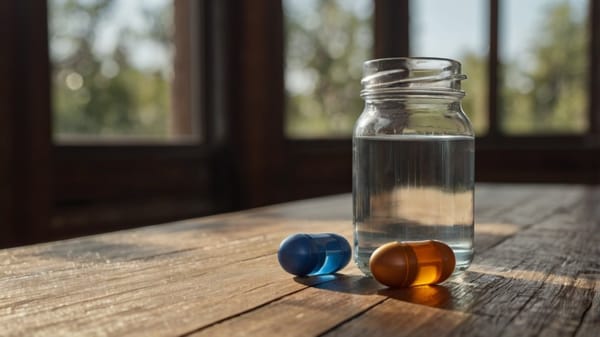Feel the Difference: What Glutamine Can Do for You
Feeling foggy, sluggish, or worn down? Glutamine helps restore gut health, energy, and recovery—right when your body needs support.

Ever feel like your body just doesn’t bounce back the way it used to? If recovery takes longer, digestion feels off, or energy crashes hit harder than they used to, glutamine might be what you’re missing.
It’s not just for athletes — this under-the-radar amino acid helps your body rebuild, refuel, and stay resilient. Curious how something so simple can make such a difference? Let’s break it down.
What Is Glutamine — and Why Should You Care?
Glutamine is an amino acid — basically a building block your body uses to repair tissues, support the immune system, and keep digestion running smoothly.
It’s considered a “conditionally essential” amino acid. Translation: your body normally makes enough on its own… unless you're under stress, injured, recovering, or facing higher physical demands.
Sound familiar? Your body’s natural production of glutamine can fall behind when life gets demanding — physically or mentally. Stress, illness, workouts, poor diet, even just a packed schedule can all deplete your glutamine stores.
When that happens, systems that rely on it — like your gut, immune response, and muscle recovery — start to lag.
This is where supplementing with glutamine comes in. It’s not about taking something new — it’s about topping off a resource your body already uses to function at its best.

Glutamine and Gut Health: The Daily Reset Your Digestion Needs
One of the biggest — and most overlooked — benefits of glutamine is gut repair.
Your intestines are lined with cells that turn over rapidly. Glutamine fuels these cells. When levels are low, the gut lining can weaken, leading to permeability issues — often called "leaky gut." This can show up as:
- Bloating after meals
- Food sensitivities
- Brain fog
- Joint discomfort
- Low energy after eating
By supplementing glutamine, you’re giving your gut lining the fuel it needs to repair, rebuild, and reseal itself. A strong gut lining means better digestion, better nutrient absorption, and less immune overreaction.
Best time to take it? First thing in the morning on an empty stomach. Mix it in water or a light shake — it’s flavorless, fast-absorbing, and effective before food hits your system.
Muscle Recovery Without the Soreness
You don’t have to be training for a marathon to care about recovery. Whether you’re doing resistance training, long walks, yard work, or just staying active — sore muscles can slow you down.
Glutamine helps your muscles bounce back faster. After physical stress, it supports muscle protein synthesis and buffers against the breakdown that causes soreness. It also helps reduce inflammation and speeds up the repair process.
And here’s the kicker: it helps preserve lean muscle mass during periods of stress or inactivity — a key factor in staying strong and resilient long-term.
Tip: If you’re doing any strength training or physical therapy, take glutamine within 30 minutes post-workout. You’ll feel the difference the next morning.
Energy Support That Doesn’t Rely on Caffeine
Glutamine doesn’t give you a jolt — but it does help your body use energy more efficiently.
Here’s how:
- It helps stabilize blood sugar by supporting glucose production in the liver.
- It supports nitrogen balance, which affects overall cellular energy.
- It feeds the cells in your brain and digestive system — two of the most energy-hungry parts of your body.
The result? Fewer mid-day crashes, more mental clarity, and better overall stamina. Especially if you're someone who tends to hit a wall around 2-3 PM, glutamine can help keep things steady without needing that third coffee.
Immune Support That’s Built-In, Not Added On
Your immune system depends on glutamine — especially your white blood cells and intestinal immune function.
During periods of stress (travel, poor sleep, overexertion, seasonal changes), your body pulls glutamine from your muscles to fuel immune responses. If your levels are already low, you’re left more vulnerable to colds, flus, and slow healing.
By keeping glutamine topped up, you’re not just helping your immune system respond — you’re giving it the foundation to stay ready year-round.
How to Use Glutamine Daily
No need to overcomplicate this. Here's how to work glutamine into your daily routine:
Basic Dosing
- 5 grams (1 teaspoon), once or twice per day
- Mix in water, juice, or a smoothie — it dissolves easily and has no taste
Best Times to Take It
- Morning (empty stomach) – ideal for gut health, immune support, and daily energy
- Post-workout or before bed – supports muscle repair and overnight recovery
You can use glutamine solo or stack it with other beginner-friendly supplements:
- With collagen in the morning for gut + skin support
- With creatine post-workout for muscle recovery and strength
- With magnesium at night to support deeper sleep and muscle relaxation
What to Expect (And When)
Glutamine doesn’t shout. It works in the background — and it works best with consistency.
Here’s what many people notice:
- Within a few days: less bloating, smoother digestion, better mood
- After a week or two: less soreness, better energy, improved mental clarity
- Over time: stronger workouts, deeper sleep, faster recovery, and overall vitality
It’s subtle — but powerful. Think of it as tuning up your body’s recovery systems so you can move through the day with more resilience.
Final Thoughts: Start Now — Your Body Will Thank You
If you’re feeling slower recovery, low energy, or digestive issues creeping in — glutamine gives your body a simple tool to push back. No gimmicks. Just results you can feel.
You’re not starting over. You’re fueling what’s already working inside you.
Start today with 5 grams in the morning — and let glutamine quietly upgrade your digestion, energy, and strength from the inside out.




